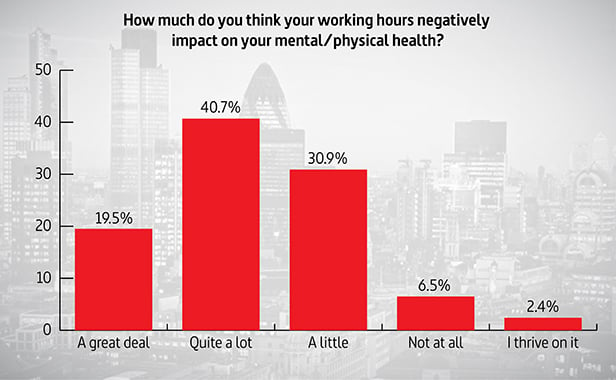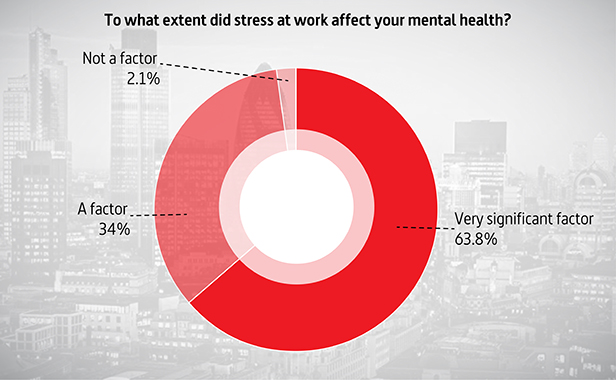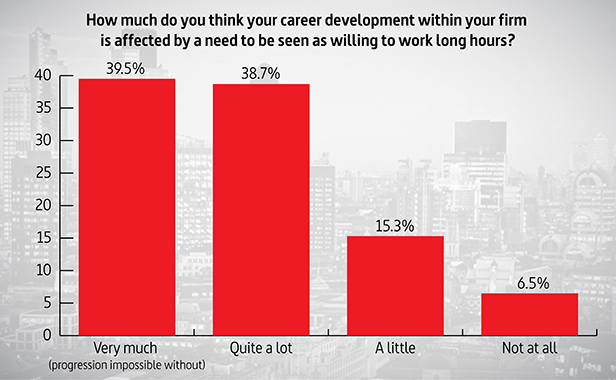Burnt out: new research highlights impact of long working hours on lawyers' mental health
Cancelled holidays, 70-hour weeks and anxiety - partners blame long hours culture for mental health problems as Legal Week survey highlights reluctance to come forward
May 16, 2018 at 10:01 AM
8 minute read
The overwhelming majority of City partners believe their mental and physical health is being harmed by the increasing number of hours they work, but many are still reluctant to discuss their mental wellbeing with colleagues, according to the results of a new survey.
Legal Week's Big Question survey of 130 lawyers found 91% believe long working hours are negatively impacting their mental and physical health, with 20% stating their working hours harm their health 'a great deal'. Fewer than one in 10 respondents said their long hours did not affect them negatively.
The findings, published as a host of firms hold events for Mental Health Awareness Week, also highlight the extent to which long hours are encroaching on lawyers' personal lives, with many saying already-long hours had increased year on year and predicting a similar increase next year.
More than a third (37%) of respondents said they regularly work more than 60 hours each week, with 15% of this group clocking in more than 70 hours a week. A further 37% work at least 50 hours each week, with only 4% working the equivalent of an eight-hour day.
 With 12-hour-plus workdays a norm for many respondents, weekend working is also standard practice, with virtually all respondents working at least one weekend a month, and almost half (45%) working two or three out of every four weekends. More than one in 10 respondents admitted to working every weekend.
With 12-hour-plus workdays a norm for many respondents, weekend working is also standard practice, with virtually all respondents working at least one weekend a month, and almost half (45%) working two or three out of every four weekends. More than one in 10 respondents admitted to working every weekend.
Holidays have more protection than weekends, but almost 15% said they had either cancelled or cut short a holiday more than six times during the past five years because of work commitments, with 3% stating they have had to do this on at least 20 separate occasions over that period.
Former Shearman & Sterling partner-turned-psychotherapist Jon Coppin said of the impact of long hours: "Law is a tough environment and it's partly that toughness that attracts people. It makes it more likely in the long term for problems to accrue, because over and over again when you work all night an important personality trait is reinforced – that you're invincible."
The survey highlights the toll that this lack of work/life balance is having on lawyers, despite firms' efforts to boost awareness of mental health issues and to improve work allocation processes in a bid to better manage hours.
Roughly 40% of respondents said they had experienced mental health issues while working as a lawyer, with three quarters of these currently suffering from mental illness.
 Commenting on the findings, Elizabeth Rimmer, chief executive of LawCare, said: "We know that it's really hard for lawyers to admit they are struggling – they are known to be perfectionists and their job is to fix other people's problems. Most of the time, people just need reassurance that they're not the only one who is struggling, and by sharing the problem it becomes easier to solve."
Commenting on the findings, Elizabeth Rimmer, chief executive of LawCare, said: "We know that it's really hard for lawyers to admit they are struggling – they are known to be perfectionists and their job is to fix other people's problems. Most of the time, people just need reassurance that they're not the only one who is struggling, and by sharing the problem it becomes easier to solve."
One London partner, who wished to remain anonymous, said: "The law can be a very unforgiving place and the workload and lack of sympathy can create stress. I have seen people suffer from depression, becoming alcoholics, developing eating disorders."
Virtually every single one of the lawyers admitting to mental health problems (98%) said work stress had played a part in their condition but, despite this link, three quarters opted not to disclose their illness at work, with 40% saying this was because of a fear of negative consequences.
While firms have been making efforts to make it easier for people to come forward, the survey highlights how much progress is still needed in order to make a difference.
One anonymous London partner admitted: "I never felt able to tell anyone at work what I was going through. I didn't feel able to. I felt it would count against me."
Martin Mankabady, a Dentons corporate partner and mental health first aider, said: "I am not surprised that people still feel there is a stigma attached. I don't think things will change overnight but the more people are aware of it, the better. If mental health issues affect one in four people and I look at this corridor I am sat on now, that means that almost every other office has somebody struggling with mental illness."
The majority of respondents to Legal Week's survey have been practising for at least 20 years, suggesting that even senior lawyers are not exempt from the strains of working life and the fear of repercussions.
But if even those who have already made it to partner are hesitant about discussing their problems within the workplace, difficulties are likely to be compounded for those still keen to climb the ranks.
Jonathan de Lance-Holmes, an investment funds partner at Linklaters who talks openly about the mental health issues he has faced in the past, said: "A lot of people are still hesitant. I felt I had less to lose by talking as I was already senior – I felt more secure with that, but it still wasn't easy to start with. I think it is more difficult up to junior/mid-partner level."
 Coppin added: "Once people get all the way to partnership and find they're still not satisfied, it can be a very difficult place to be – you can end up feeling alienated. Partnership doesn't solve that many problems – younger people tend to be suffering from anxiety and older people tend to be suffering more from depressive issues. Both are examples of stress – the response to 25 years of it is to feel trapped and stuck and depressed; the response to two or three years is to feel anxious that you can't do another 20 years of it."
Coppin added: "Once people get all the way to partnership and find they're still not satisfied, it can be a very difficult place to be – you can end up feeling alienated. Partnership doesn't solve that many problems – younger people tend to be suffering from anxiety and older people tend to be suffering more from depressive issues. Both are examples of stress – the response to 25 years of it is to feel trapped and stuck and depressed; the response to two or three years is to feel anxious that you can't do another 20 years of it."
More than 90% of respondents believe opportunities for career development at their firm are affected by their willingness to work long hours, with many arguing that progression, especially to partner level, is not possible without putting in long hours.
Despite many firms now offering access to counselling services and resilience training becoming standard practice for lawyers of all levels, opinions were divided on whether firms are offering enough support to those suffering from stress and mental health issues.
While roughly two thirds of respondents acknowledged that firms were taking the issue more seriously than before, almost the same percentage argued that their own firms were not taking enough active steps to help lawyers deal with stress and mental health issues.
One respondent said: "The management take it seriously, but I still don't think most people are comfortable actually reporting or dealing with it in front of their supervisor without fear for their career in a world which requires resilience."
CMS UK funds partner Cathy Pitt said: "It goes without saying that a long hours culture, without careful management, has a negative effect on mental and physical health. Our profession hasn't been good in the past about prioritising wellbeing, but if we don't prioritise it we're no use to anyone. We tend to prioritise our client work before anything else and yet everything depends on us being in good shape."
Freshfields disputes partner John Blain – a mental health first aider who has interviewed several of the firm's partners suffering from mental health issues for an internal effort to boost awareness at the firm – said: "All partners have experienced problems and difficulties at times in their career. Has it hindered them ultimately? No. Even if it was a more long-term issue I don't think it would matter. You can manage those conditions in a way that still allows the person to be a successful contributor to the business – there just needs to be a conversation about how it is managed."
For more, see:
This content has been archived. It is available through our partners, LexisNexis® and Bloomberg Law.
To view this content, please continue to their sites.
Not a Lexis Subscriber?
Subscribe Now
Not a Bloomberg Law Subscriber?
Subscribe Now
NOT FOR REPRINT
© 2025 ALM Global, LLC, All Rights Reserved. Request academic re-use from www.copyright.com. All other uses, submit a request to [email protected]. For more information visit Asset & Logo Licensing.
You Might Like
View All
KPMG's Bid To Practice Law in US On Hold As Arizona Court Exercises Caution

Combative Arguments at EU's Highest Court Over Google's €4.13B Antitrust Fine Emphasize High Stakes and Invoke Trump
4 minute read
Law Firms 'Struggling' With Partner Pay Segmentation, as Top Rainmakers Bring In More Revenue
5 minute readTrending Stories
- 1Uber Files RICO Suit Against Plaintiff-Side Firms Alleging Fraudulent Injury Claims
- 2The Law Firm Disrupted: Scrutinizing the Elephant More Than the Mouse
- 3Inherent Diminished Value Damages Unavailable to 3rd-Party Claimants, Court Says
- 4Pa. Defense Firm Sued by Client Over Ex-Eagles Player's $43.5M Med Mal Win
- 5Losses Mount at Morris Manning, but Departing Ex-Chair Stays Bullish About His Old Firm's Future
Who Got The Work
J. Brugh Lower of Gibbons has entered an appearance for industrial equipment supplier Devco Corporation in a pending trademark infringement lawsuit. The suit, accusing the defendant of selling knock-off Graco products, was filed Dec. 18 in New Jersey District Court by Rivkin Radler on behalf of Graco Inc. and Graco Minnesota. The case, assigned to U.S. District Judge Zahid N. Quraishi, is 3:24-cv-11294, Graco Inc. et al v. Devco Corporation.
Who Got The Work
Rebecca Maller-Stein and Kent A. Yalowitz of Arnold & Porter Kaye Scholer have entered their appearances for Hanaco Venture Capital and its executives, Lior Prosor and David Frankel, in a pending securities lawsuit. The action, filed on Dec. 24 in New York Southern District Court by Zell, Aron & Co. on behalf of Goldeneye Advisors, accuses the defendants of negligently and fraudulently managing the plaintiff's $1 million investment. The case, assigned to U.S. District Judge Vernon S. Broderick, is 1:24-cv-09918, Goldeneye Advisors, LLC v. Hanaco Venture Capital, Ltd. et al.
Who Got The Work
Attorneys from A&O Shearman has stepped in as defense counsel for Toronto-Dominion Bank and other defendants in a pending securities class action. The suit, filed Dec. 11 in New York Southern District Court by Bleichmar Fonti & Auld, accuses the defendants of concealing the bank's 'pervasive' deficiencies in regards to its compliance with the Bank Secrecy Act and the quality of its anti-money laundering controls. The case, assigned to U.S. District Judge Arun Subramanian, is 1:24-cv-09445, Gonzalez v. The Toronto-Dominion Bank et al.
Who Got The Work
Crown Castle International, a Pennsylvania company providing shared communications infrastructure, has turned to Luke D. Wolf of Gordon Rees Scully Mansukhani to fend off a pending breach-of-contract lawsuit. The court action, filed Nov. 25 in Michigan Eastern District Court by Hooper Hathaway PC on behalf of The Town Residences LLC, accuses Crown Castle of failing to transfer approximately $30,000 in utility payments from T-Mobile in breach of a roof-top lease and assignment agreement. The case, assigned to U.S. District Judge Susan K. Declercq, is 2:24-cv-13131, The Town Residences LLC v. T-Mobile US, Inc. et al.
Who Got The Work
Wilfred P. Coronato and Daniel M. Schwartz of McCarter & English have stepped in as defense counsel to Electrolux Home Products Inc. in a pending product liability lawsuit. The court action, filed Nov. 26 in New York Eastern District Court by Poulos Lopiccolo PC and Nagel Rice LLP on behalf of David Stern, alleges that the defendant's refrigerators’ drawers and shelving repeatedly break and fall apart within months after purchase. The case, assigned to U.S. District Judge Joan M. Azrack, is 2:24-cv-08204, Stern v. Electrolux Home Products, Inc.
Featured Firms
Law Offices of Gary Martin Hays & Associates, P.C.
(470) 294-1674
Law Offices of Mark E. Salomone
(857) 444-6468
Smith & Hassler
(713) 739-1250










